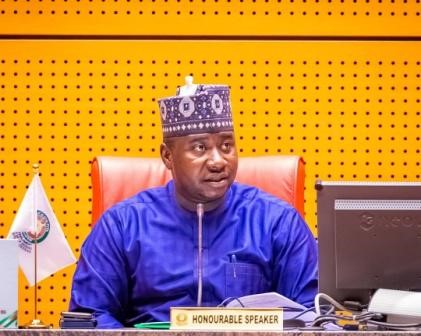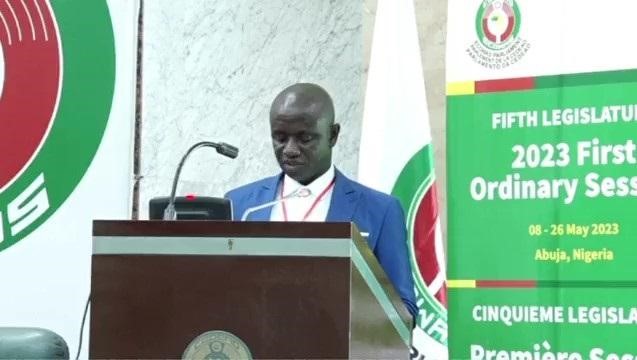By Kebba AF Touray
The Gambia’s Majority and Minority Leaders, Hon. Bilay G. Tunkara and Hon. Alhagie S. Darboe, have informed their colleague members of the ECOWAS Parliament that reform efforts have been initiated in the country to enhance accuracy and avert duplication in Gambia’s electoral system.
The parliamentarians said this last Saturday, 24 May 2025, while presenting their country reports to the regional parliament, during the ongoing first ordinary session of the parliament in Abuja, Nigeria.
Their reports touched on key areas of the Gambia, namely on elections, political participation, freedom of speech, arbitrary arrest, human rights, reconciliation measures and others.

On Elections:
Both Hons. Tunkara and Darboe said the Gambia’s electoral process has undergone significant improvements, particularly in the wake of the 2021 presidential elections, the 2022 National Assembly elections and the 2023 Council elections.
“In response to concerns over voter registration procedures and the continued use of the traditional marble voting system, electoral reform efforts have been initiated since 2021, with a focus on digitising voter registration to enhance accuracy and prevent duplication,” they said.
On Political Participation:
They reported that political participation in The Gambia has significantly expanded since the country’s democratic transition in 2017, adding that the period has seen a surge in political party registration; heightened engagement in electoral processes and a growing sense of civic awareness among citizens.
The lawmakers said that the number of registered political parties has more than doubled, rising from nine political parties in 2016 when President Adama Barrow was first elected, to approximately 19 parties today.
Good Governance, Rule of Law:
Both indicated that key among the efforts of the government to promote good governance and the rule of law in the country, is the establishment of institutions such as the “Access to Information Commission; the Constitutional Review Commission (CRC), and the Anti-Corruption Commission (ACC) that they are currently working on to establish, all of which is aimed at enhancing accountability and democratic governance.
Early Warning Analysis:
They stated that though The Gambia remains largely stable, there are early warning indicators of potential political unrest, particularly during election periods, together with judicial proceedings involving high-profile figures from the previous administration of former President Yaya Jammeh.
Arbitrary Arrest or Detention:
Both informed the ECOWAS Parliament that since the fall of former President Yahya Jammeh, The Gambia has made notable progress in reducing incidents of arbitrary arrest and detention, acknowledging that while occasional allegations persist regarding the excessive use of authority by certain security agencies, institutional mechanisms have been significantly strengthened.
Access to Justice:
Both detailed that in the wake of the country’s democratic transition, the judiciary has been a central focus of institutional transformation aimed at enhancing independence, accountability and public trust, stressing that reforms such as the establishment of the TRRC, was aimed to enhance accountability, transparency and public trust which they said has collectively strengthened the judiciary’s capacity to uphold the rule of law and protect fundamental human rights in the country.
“However, equitable access to justice remains hindered by gaps in legal aid, especially for marginalised and rural populations, and by the inadequate physical infrastructure of the courts across the country,” Hon. Darboe said.
Freedom of Speech and Press:
“According to the nation’s Public Utilities Regulatory Authority (PURA) and the 2024 report from ‘Reporters Without Borders’ (RSF), The Gambia now has 47 radio stations; five television channels; four daily newspapers; and one newspaper published three times a week,” Hon. Darboe said.
On Respect for Fundamental Human Rights and Civil Liberties:
According to Hon. Darboe, The Gambia has taken formidable steps to reinforce this justice agenda.
“The enactment of the Prevention and Prohibition of Torture Act in 2023 institutionalised a legal framework to eradicate torture and other cruel, inhuman or degrading treatment,” he said.
Both said that this measure reflects the government’s broader commitment to democratic consolidation and the rule of law through comprehensive legal reforms.
On National Reconciliation Measures:
“President Adama Barrow has officially declared February 16 National Dialogue Day in The Gambia. This decision followed the successful convening of such an important forum in February last year, coinciding with the country’s Independence celebrations,” Hon. Darboe disclosed.
This forum, he said, was a landmark event that fostered inclusive national conversations and generated meaningful outcomes that have positively impacted the country’s governance and development trajectory.
On Refugees, Asylum Seekers, Displaced Persons, and Statelessness:
“According to a 2021 data from the United Nations High Commissioner for Refugees (UNHCR), The Gambia hosted a total of 4,643 persons of concern, comprising 4,429 recognized refugees and 214 asylum seekers,” Hon. Darboe said, and reported that the majority of these refugees, 4,056 individuals, originate from Senegal, while 162 come from Côte d’Ivoire; 105 from Sierra Leone and 63 from the Democratic Republic of Congo (DRC).
He said the gender distribution among this population was relatively balanced, with 2,262 females and 2,121 males, most of whom fell within the age bracket of 18–59.
On Agricultural Production and Food Security:
In 2022, they said the Government of the Gambia in collaboration with the United Nations World Food Program (WFP) and with funding from the Global Agriculture and Food Security Program (GAFSP), launched the Gambia Agriculture and Food Security Project, adding that this five-year initiative aims to reinforce food security and nutrition, and increase incomes for over 170,000 vulnerable individuals including farmers, food processors, community members, and school children.
On Environmental Challenges and Natural Disasters:
Both said that assessments show that the Gambia’s geographical characteristics—a low-lying coastal country with a dense population concentrated along the River Gambia—have rendered it particularly vulnerable to the adverse effects of climate change. They added that these include frequent flooding, coastal erosion, droughts, and intense storms, all of which pose significant risks to key sectors such as agriculture, tourism, fisheries, and public health.
“In response to these growing challenges, the Government of The Gambia has adopted several comprehensive policy frameworks to guide climate resilience and sustainable development efforts. These include the National Climate Change Policy (NCCP), The Gambia 2050 Climate Vision, and The Gambia’s Long-Term Climate-Neutral Development Strategy 2050 (LTS),” he said.
On Infrastructure:
The lawmakers reported that with a view to responding to issues related to infrastructural challenges, the Government of the Gambia has initiated several adaptation measures, including the elevation of key structures and pavements to strengthen resilience and mitigate the impact of flooding.
On Energy and Mines:
Both indicated that investments in The Gambia’s energy sector have significantly improved access to affordable and reliable electricity, with records indicating that at least 74% of Gambians already have power as of the end of 2024, including 50% in rural communities.
“Notable projects contributing to this progress include an interconnection with 10 in Senegal, which provides 50 megawatts of power to augment The Gambia’s bulk supply system,” they outlined.


















